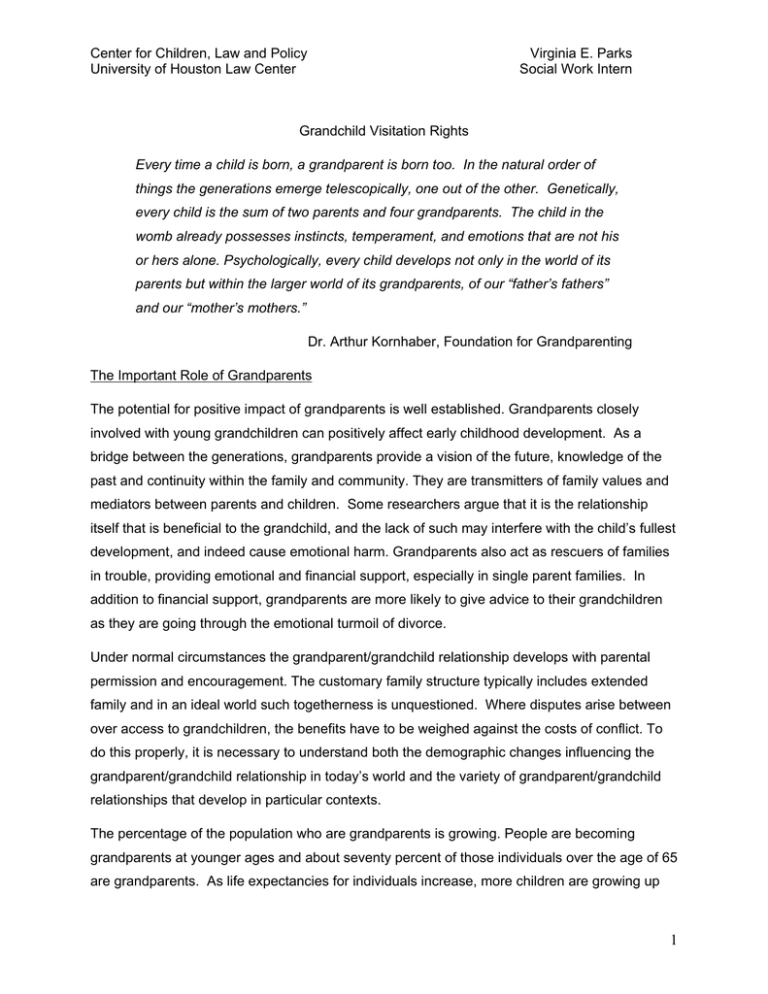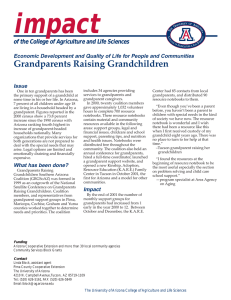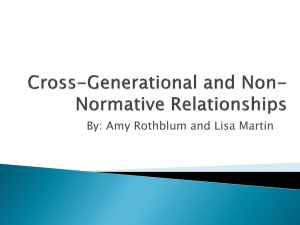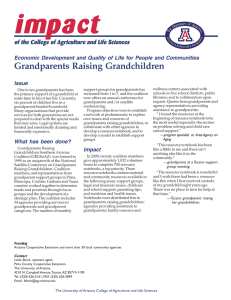Center for Children, Law and Policy Virginia E. Parks
advertisement

Center for Children, Law and Policy University of Houston Law Center Virginia E. Parks Social Work Intern Grandchild Visitation Rights Every time a child is born, a grandparent is born too. In the natural order of things the generations emerge telescopically, one out of the other. Genetically, every child is the sum of two parents and four grandparents. The child in the womb already possesses instincts, temperament, and emotions that are not his or hers alone. Psychologically, every child develops not only in the world of its parents but within the larger world of its grandparents, of our “father’s fathers” and our “mother’s mothers.” Dr. Arthur Kornhaber, Foundation for Grandparenting The Important Role of Grandparents The potential for positive impact of grandparents is well established. Grandparents closely involved with young grandchildren can positively affect early childhood development. As a bridge between the generations, grandparents provide a vision of the future, knowledge of the past and continuity within the family and community. They are transmitters of family values and mediators between parents and children. Some researchers argue that it is the relationship itself that is beneficial to the grandchild, and the lack of such may interfere with the child’s fullest development, and indeed cause emotional harm. Grandparents also act as rescuers of families in trouble, providing emotional and financial support, especially in single parent families. In addition to financial support, grandparents are more likely to give advice to their grandchildren as they are going through the emotional turmoil of divorce. Under normal circumstances the grandparent/grandchild relationship develops with parental permission and encouragement. The customary family structure typically includes extended family and in an ideal world such togetherness is unquestioned. Where disputes arise between over access to grandchildren, the benefits have to be weighed against the costs of conflict. To do this properly, it is necessary to understand both the demographic changes influencing the grandparent/grandchild relationship in today’s world and the variety of grandparent/grandchild relationships that develop in particular contexts. The percentage of the population who are grandparents is growing. People are becoming grandparents at younger ages and about seventy percent of those individuals over the age of 65 are grandparents. As life expectancies for individuals increase, more children are growing up 1 Center for Children, Law and Policy University of Houston Law Center Virginia E. Parks Social Work Intern with at least two living grandparents and many have three or four. As these trends continue, more individuals will continue to have long-lasting relationships with their grandparents. Furthermore, a growing number of grandparents find themselves completely responsible for the emotional and physical wellbeing of their grandchildren. Data pulled from the 2000 census indicate that 4.5 million American children are living with grandparents as head-of-household. Almost 10% of those grandparent-dependent children reside in Texas and 244,000 of those have no parent living with them. Of the approximately 250,000 Texans who report they are primary caregivers for their grandchildren, 21% do so while living in poverty. Although each child is valuable, many of them are removed from parental custody and placed with their grandparents because a court decided it is in their best interest. It must be added that the potential exists for grandparents to have a negative impact on the parent/child relationship or the wellbeing of the child. One obvious situation might involve abuse of either grandchild or parent by a grandparent. Another might be one in which there is such contempt between parent and grandparent that an ongoing grandparent/child relationship would counter the child’s general welfare and relationship with the parent. Pre-Troxel State Court Decisions Absent a Statute State courts have been examining the question of grandparent visitation for decades. In the early part of the twentieth century there were no statutes permitting grandparents to petition for visitation. Nonetheless, courts took four different approaches when deciding questions of grandparent visitation over parental objections. First, if there was a pending action involving the child, the court may have allowed the grandparents standing to pursue visitation, and in the course of evaluating the particular facts, ordered such visitation. Second, in limited circumstances, courts granted standing and visitation to grandparents even when there was no other matter before the court. Third, some courts granted standing to grandparents to seek visitation with their grandchildren and then conducted a best interest analysis to determine if the visitation was warranted over parental objections. These courts considered a variety of factors in making the substantive determination of whether to grant visitation, although the overriding legal criterion was and is the best interests of the child, a standard that is susceptible to varying interpretations. Lastly, when there was no statute, courts denied grandparents standing to request visitation with their grandchildren and never reached the substantive question of whether or not the visitation was in the child’s best interests. 2 Center for Children, Law and Policy University of Houston Law Center Virginia E. Parks Social Work Intern As state legislatures across the country developed laws to govern these custody decisions, Washington created the most liberal and far-reaching legislation. The statute under which the Troxel’s sued for visitation was the broadest and most liberal of all, allowing virtually anyone involved in the child’s life to sue for visitation. Readers should recall that these parents of a deceased son were never denied visitation by their daughter-in-law but that the mother had reduced paternal grandparent visitation when she remarried and sought to join her family with her new partner’s. Mr. and Mrs. Troxel feared that this reduction in visitation would inevitably lead to elimination of their visits altogether. Post Troxel v Granville The 2007-2008 Texas family code (FAM 153.433-434) allows that the court should order possession or access of a grandparent to a biological or adopted grandchild if at least one of the parents still have legal parenting rights, if the grandparent can prove by a preponderance of evidence that denial would “significantly impair the child’s physical health or emotional wellbeing,” and that the grandparent(s) requesting access is parent of an adult child who is either deceased, declared incompetent, incarcerated within the previous three months, or doesn’t have legal access to the child. If both parents are deceased or have had their parental rights terminated and the child is subsequently being adopted by someone other than the child’s stepparent, grandparents aren’t granted the right to sue for access. At least one other state has addressed the issue of grandchild visitation rights since Troxel v Granville. California law provides that a court may grant visitation if it finds that the bond between grandparent and child is such that visitation is in the child’s best interest. Grandparents have standing to petition for visitation in California if the child’s parents are separated, one parent’s whereabouts are unknown for more than a month, or the child isn’t living with either parent. Yet the refutable presumption is that if the parent, parents (whether natural or adopted) oppose visitation, then it probably isn’t in the child’s best interest. A big difference between the California and Texas statutes is the extension of mandatory mediation to visitation disputes involving grandparents. The mediator interviews all parties involved including the child if deemed necessary. Only if mediation is unsuccessful, does the mediator inform the court and a hearing is scheduled. 3 Center for Children, Law and Policy University of Houston Law Center Virginia E. Parks Social Work Intern Families are Complicated Systems The first cultural system a child learns to function within is the immediate then extended family. They learn that certain people play certain roles in the family system and certain rules must be followed. The family is one of the most basic building blocks of society yet also quite complicated. The often unspoken rules and rules of families differ depending on ethnicity and culture, size and parenting style, income, class and education status, even geographic location. The generational bonds that connect a child to place and culture should not be severed easily. The committee is encouraged to consider options that will preserve the security provided a child by continuation of important familial relationships. Grandparents are vital to their grandchildren and the state when stepping in as substitute parents. They are just as important as just grandparents. Constitutionality should be preserved if resources such as family counseling and mediation are mandated in disputes prior to and hopefully instead of going to court. Doing so should save money for petitioners, parents, and the state. In cases where mediation fails, parental rights will usually prevail. However the need for visitation hearings should be reduced if the grownups have facilitated discussions and try to work out among themselves what is in the best interest of their child. References American Association of Retired Persons (AARP), Texas State Fact Sheet for Grandparents and Other Relatives Raising Children http://www.aarp.org/family/grandparenting/articles/grandparent_tip_sheet. Marrus, Ellen. Over the Hills and Through the Woods to Grandparent’s House We Go: or do we, Post-Troxel? Arizona Law Review (Vol. 43:4) O’Connor’s Family Code Plus (2007-08). Jones McClure Publishing, Houston, Texas Family Law Code, Selected States and Ali Principles with Commentary (2008) Wolters Kluwer, Austin, Texas Casper, Lynne M. (2002) Continuity and Continuity in the American Family. Sage Publications, Inc. Thousand Oaks, California 4







